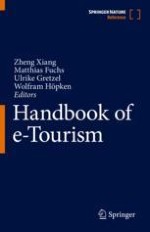2022 | OriginalPaper | Chapter
2. Development of Information and Communication Technology: From e-Tourism to Smart Tourism
Author : Rosanna Leung
Published in: Handbook of e-Tourism
Publisher: Springer International Publishing
Activate our intelligent search to find suitable subject content or patents.
Select sections of text to find matching patents with Artificial Intelligence. powered by
Select sections of text to find additional relevant content using AI-assisted search. powered by
